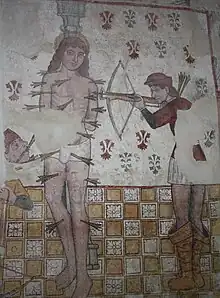bésta
See also: besta
Galician

15th-century depiction. Santa María de Labrada, Guitiriz, Galicia.
Etymology
From Old Galician-Portuguese baesta (“crossbow”) (13th century, Cantigas de Santa Maria), from Latin ballista, from Ancient Greek βαλλίστρα (ballístra). Cognate with Portuguese besta and Spanish ballesta.
Pronunciation
- IPA(key): [ˈbɛs̺t̪ɐ]
Noun
bésta f (plural béstas)
- crossbow
- 1295, R. Lorenzo, editor, La traducción gallega de la Crónica General y de la Crónica de Castilla, Ourense: I.E.O.P.F., page 17:
- et da Torre do Ouro esso meesmo, cõ tra[bu]quetes que y tĩjnã, que os aqueixauã ademays, et cõ beestas de torno et de outras muytas maneyras
- And the same from the Torre del Oro [a castle in Seville]: they were attacking them with little catapults and winched crossbows, and in many other ways
- hock (the tarsal joint of a digitigrade quadruped)
Derived terms
- besteiro
- Besteiros
- Bestilleiros
References
- “baesta” in Dicionario de Dicionarios do galego medieval, SLI - ILGA 2006–2022.
- “beest” in Xavier Varela Barreiro & Xavier Gómez Guinovart: Corpus Xelmírez - Corpus lingüístico da Galicia medieval. SLI / Grupo TALG / ILG, 2006–2018.
- “bésta” in Tesouro informatizado da lingua galega. Santiago: ILG.
- “bésta” in Álvarez, Rosario (coord.): Tesouro do léxico patrimonial galego e portugués, Santiago de Compostela: Instituto da Lingua Galega.
This article is issued from Wiktionary. The text is licensed under Creative Commons - Attribution - Sharealike. Additional terms may apply for the media files.